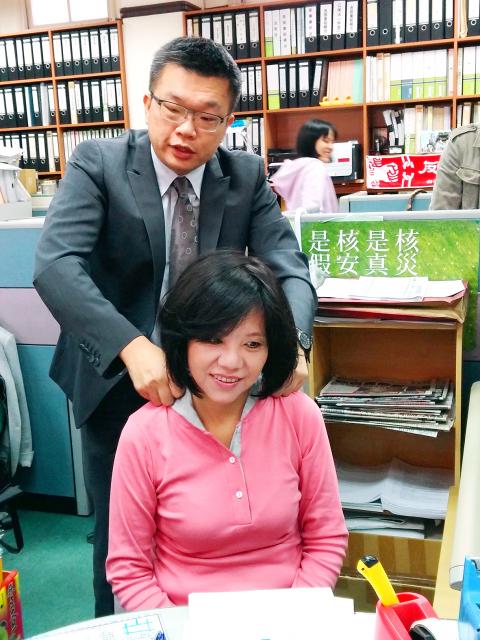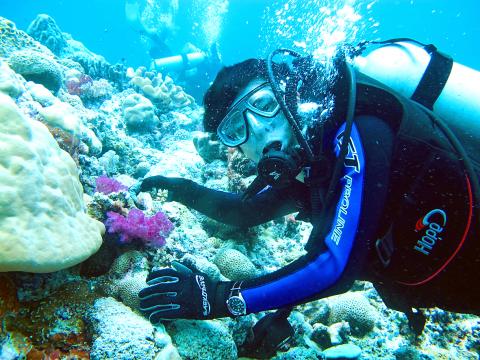There is more going on in legislators’ lives than just drafting laws, making policy addresses and negotiating in the legislature, Democratic Progressive Party (DPP) legislators Tsai Chi-chang (蔡其昌) and Chen Chi-mai (陳其邁) said.
Tsai is a self-taught masseur, while Chen is a certified master scuba diver.
Tsai said he learned the art of massage because he has been plagued by neck pain for years.

Photo: Tseng Wei-chen, Taipei Times
He first developed neck problems when he was director of the then-Taichung County’s Civil Affairs Bureau and the county’s government-council liaison from 1997 to 2001, a job that strained both his body and soul, Tsai said.
SEEKING RELIEF
He tried everything from massage to acupuncture and Pilates to seeing a chiropractor to alleviate the pain, which is how he learned about the human form and its pressure points, he said.

Photo: Courtesy of Chen Chi-mai
His condition had been excruciating up until 2004, when he first became a lawmaker, but it has gradually abated as he learned to master his own body, Tsai said.
Massage is one of the most convenient therapies that is not spatially limited, Tsai said.
Among those frequenting his “clinic” are his mother and wife, and a short massage session relieves their soreness as he works on their pressure points, the lawmaker said.
Other legislators have also benefited from his skills.
Prior to a DPP press conference late last year, an exhausted DPP Legislator Yeh Yi-jin (葉宜津) told Tsai that she had been suffering from muscle aches for a while, so he gave her a short massage session, which helped her, Tsai said.
Tsai said everyone should learn how to relax their body and mind, and they should also learn proper training methods to build their muscles to reduce muscle aches and soreness.
Chen is equally enthusiastic about scuba diving, a passion that his wife, son and daughter have also embraced.
The entire family are licensed divers, said Chen, who also hosts of an online diving community.
Snorkeling near Kenting National Park in Pingtung County initiated him into the wonders of the undersea world, he said.
A series of discounted scuba courses offered by a diving club at National Taiwan University fueled his enthusiasm.
UNDERWATER HOLIDAYS
In addition to diving off of Green Island (綠島) and Orchid Island (蘭嶼, also known as Lanyu), Chen has visited several popular Pacific Ocean destinations in Palau, Malaysia and Indonesia, he said, adding that he had taken diving trips with former DPP legislators Chiu Tai-san (邱太三) and Lee Wen-chung (李文忠).
Scuba diving relaxes one mentally and physically, and three dives are all one needs for a perfect holiday, he said.
However, divers should also be aware of the dangers they face and should never go diving alone, he said. Raptures of the deep caused by nitrogen narcosis and decompression sickness — which can occur when a diver tries to surface too quickly — are just some of the risks, he said.
Diving in groups can minimize the risks, he said.
The waters around Taiwan and neighboring countries are diverse and beautiful, so it is a shame that so few Taiwanese learn to scuba dive, Chen said.
He said Sipadan in Malaysia was the best diving site he has visted, although Palau is his favorite spot.

Alain Robert, known as the "French Spider-Man," praised Alex Honnold as exceptionally well-prepared after the US climber completed a free solo ascent of Taipei 101 yesterday. Robert said Honnold's ascent of the 508m-tall skyscraper in just more than one-and-a-half hours without using safety ropes or equipment was a remarkable achievement. "This is my life," he said in an interview conducted in French, adding that he liked the feeling of being "on the edge of danger." The 63-year-old Frenchman climbed Taipei 101 using ropes in December 2004, taking about four hours to reach the top. On a one-to-10 scale of difficulty, Robert said Taipei 101

Nipah virus infection is to be officially listed as a category 5 notifiable infectious disease in Taiwan in March, while clinical treatment guidelines are being formulated, the Centers for Disease Control (CDC) said yesterday. With Nipah infections being reported in other countries and considering its relatively high fatality rate, the centers on Jan. 16 announced that it would be listed as a notifiable infectious disease to bolster the nation’s systematic early warning system and increase public awareness, the CDC said. Bangladesh reported four fatal cases last year in separate districts, with three linked to raw date palm sap consumption, CDC Epidemic Intelligence

Two Taiwanese prosecutors were questioned by Chinese security personnel at their hotel during a trip to China’s Henan Province this month, the Mainland Affairs Council (MAC) said yesterday. The officers had personal information on the prosecutors, including “when they were assigned to their posts, their work locations and job titles,” MAC Deputy Minister and spokesman Liang Wen-chieh (梁文傑) said. On top of asking about their agencies and positions, the officers also questioned the prosecutors about the Cross-Strait Joint Crime-Fighting and Judicial Mutual Assistance Agreement, a pact that serves as the framework for Taiwan-China cooperation on combating crime and providing judicial assistance, Liang

US climber Alex Honnold left Taiwan this morning a day after completing a free-solo ascent of Taipei 101, a feat that drew cheers from onlookers and gained widespread international attention. Honnold yesterday scaled the 101-story skyscraper without a rope or safety harness. The climb — the highest urban free-solo ascent ever attempted — took just more than 90 minutes and was streamed live on Netflix. It was covered by major international news outlets including CNN, the New York Times, the Guardian and the Wall Street Journal. As Honnold prepared to leave Taiwan today, he attracted a crowd when he and his wife, Sanni,